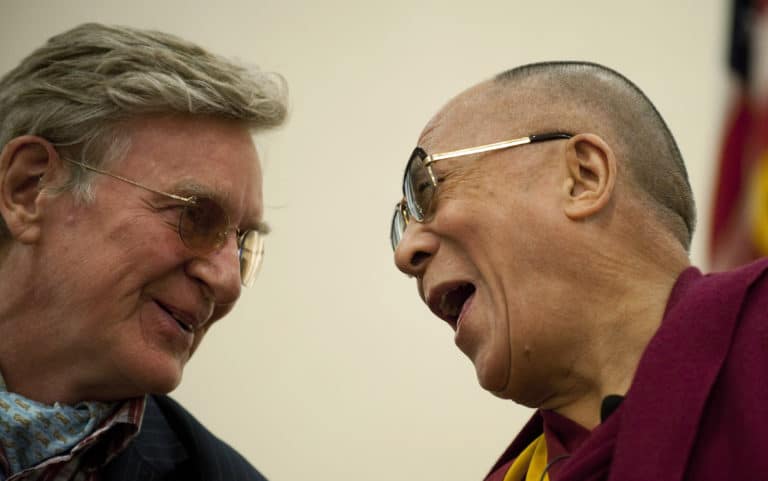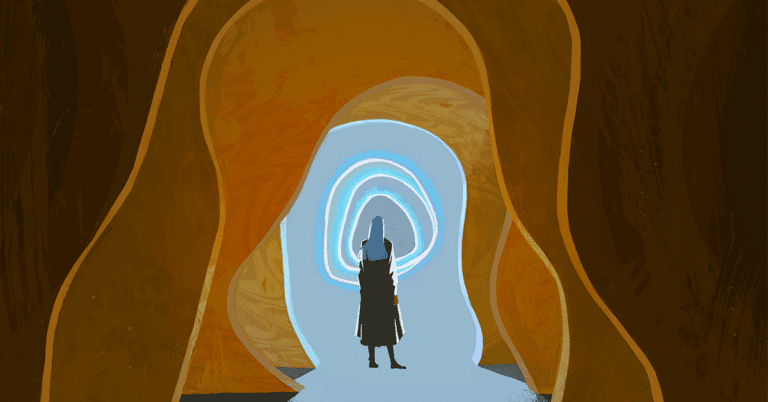
The Dalai Lama (R) and his friend Robert Thurman, co-founder of The Tibet House, laugh during a news conference ON May 12, 2011 in Newark, New Jersey. The Dalai Lama spoke about his US visit as well as his participation in the Newark Peace Education Summit. Image by Taylor Hill/Getty Images.
An Experiment With Anger, Buddha-Style
I am not interested in playing Farmville with the girl who told me to get a nose job in sixth grade. And no matter how much I honor her humanity, I just can’t imagine that changing.
OK, so perhaps the Zen teaching hadn’t sunk in quite as deep as I’d hoped when I began scrolling down the list of my Facebook friends, trying to come up with something positive to say about all 892 of them. But inspired by the wide-wandering conversation with Buddhist teachers Sharon Salzberg and Robert Thurman, I, for one, was not going to dwell on the sartorial choices of this “friend” years later. Her baby is cute; her reading list diverse; she, too, recognizes the latent wisdom of the movie Clueless.
When Ms. Salzberg began studying Buddhist meditation in Burma in 1985, her teacher instructed her to think about people she had different (read: not positive) feelings for, and to see if she could come up with one good thing about each of them:
“My very first thought was ‘I’m not going to do that. That’s what stupid people do. Go around finding the good in people. I don’t even like people who do that.'”
Within the traditional teacher-student dynamic of the monastery however, instructions were instructions, and she had to find something to like about people who do that too. And as a teacher now herself, Ms. Salzberg remembers the exercise as formative to her practice, and foundational to her approach to Buddhist-Zen kryptonite: anger.
I’m curious. What happens when we try these meditation exercises outside a secluded Burmese monastery, and in the most social of social spaces? I decided to try, though, I should admit: I am no Zen Buddhist.
The idea of relentless positivity sounds maddening. Sure, I’m of the mind that the world could use some good news. But loving thy parking-spot-stealing neighbors? For real?
I wasn’t sold. That is, until a comment from an On Being listener jolted me into the realization that I might be a part of the problem. Angry after a layoff, the commenter (who goes by the alias Color Me Enlightened) wrote, “The disappointment, sadness & anger is making me exhausted & not a fun person to hang around with.”
Oh yeah. Anger is exhausting. And what intrigues Ms. Salzberg and Mr. Thurman is not just conflict writ large but the everyday, intimate, rote sort of negative energy that add up to larger, capital-E exhausting issues. The kind of energy that consumes an office worker who just can’t stand the way her cube-mate chews her gum. The friend who adds an emoticon to every single text message (er, totally kidding ;-p). The house guest who criticizes his host’s messy closets.
The least effective response to these irritations? Mr. Thurman and Ms. Salzberg say it’s more unbounded irritation, which, left unchecked, can turn a human into a gum-cracking, emoticon-abusing, closet-chiding monster (even when the said houseguest is the Dalai Lama). The only way out? The complexity that comes with reflection on the positive, otherwise known as the practice of love and kindness.
The anger and irritation funneled through an endless churning of a news-cycle of “Who did wrong this week?” creates endless anger and irritation. I am a gum-chewing journalist trained in the school of “no news is good news.” And, after a week of bad news from healthcare woes to child-cyborg warnings, I am irritated with irritation. So irritated that I’ve become one of those people: I decided to search for some positivity. It had to be there.
So I searched on Twitter. Exactly 27 tweets down, I found out that the second season of House of Cards premiered on Valentine’s Day 2014. Romance!
Netflix Announces ‘House of Cards’ Season 2 Premiere Date http://t.co/Spqv8RCn0E
— Mashable (@mashable) December 4, 2013
And I searched on Facebook. I realized that my newsfeed is also a more or less comprehensive listing of the people who have touched my life. So, while I can’t really put words to why I’m sure my little brother’s ex-girlfriend has a kind soul, I can say that she nursed him through a bad cold. And, hey, even if we never meet, I’m glad she was there.

I looked on Instagram. They say Buddha himself had a hand in this.
What happens when you search for positivity? How long does it take you to find good news, of the personal or public variety?

